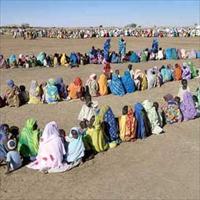President of Sudan could face arrest over Darfur war crimes

On Monday 14 July, Chief Prosecutor Luis Moreno Ocampo submitted to the pre-trial chamber of the International Criminal Court (ICC) an application for the issuance of an arrest warrant against Sudanese president Omar El Bashir for 10 counts of genocide, crimes against humanity and war crimes.
Amnesty International said that the announcement was “an important step towards ensuring accountability for human rights violations in Sudan.”
The organization called upon the Government of Sudan to ensure that its reaction to the prosecutor’s application does not have an adverse effect on the deployment and operations of the joint United Nations-African Union Mission in Darfur (UNAMID).
The organization stressed on the Sudanese Government’s role in protecting civilians and not impeding in any way the delivery of humanitarian assistance to Darfur.
The judges of the Pre-Trial Chamber will examine the Prosecutor’s application. They will decide whether there are “reasonable grounds to believe” that the Sudanese President may have committed acts of genocide, war crimes or crimes against humanity.
If his arrest is necessary to ensure his appearance at trial, or to stop him from endangering the investigations, or to prevent him from committing more crimes, the Court may issue an international arrest warrant.
In previous cases, the Judges have taken from one to three months to decide whether to issue arrest warrants. Once a warrant is issued, the government of Sudan has a legal obligation to arrest and surrender to the ICC anyone named in an arrest warrant.
The United Nations Security Council imposed on the government of Sudan and all other parties to the conflict in Darfur a legal obligation to “cooperate fully with and provide any necessary assistance to the Court and the Prosecutor” (Resolution 1593 of 31 March 2005). Recently, the President of the Security Council urged the government of Sudan and all other parties to the conflict in Darfur to cooperate fully with the Court “in order to put an end to impunity for the crimes committed in Darfur” (Statement by the President of the Security Council, 16 June 2008).
The UN Security Council also urged all States and concerned regional and other international organizations to cooperate fully with the ICC (Resolution 1593 of 31 March 2005). In addition, states that have ratified the Rome Statute of the ICC have a legal obligation under the Statute to arrest and surrender the suspect(s) named in the arrest warrant(s).
Background
Since the conflict started in 2003, over 200,000 people are believed to have died in Darfur. Over 2.3 million are internally displaced.
On 31 March 2005, the United Nations Security Council determined that the situation in Sudan constituted a threat to international peace and security and referred the case of Darfur to the ICC. On 1 June 2005, the ICC Prosecutor opened an investigation into the situation in Darfur.
Amnesty International is already campaigning for the execution of other arrest warrants issued by the ICC. The organization is calling for the arrest and surrender to the Court of Sudanese government minister Ahmad Harun and Janjawid militia leader Ali Kushayb, both suspected of war crimes and crimes against humanity committed in Darfur, against whom the ICC issued arrest warrants in April 2007.
In December 2007, the ICC Prosecutor informed the United Nations Security Council that his Office is collecting information on attacks on humanitarian workers and peacekeepers. Those would include the attack that took place in Haskanita in October 2007, in which 10 African peacekeepers were killed. The attack was attributed to armed groups, although OCampo did not name any suspects. UN sources announced in December 2007 that Ocampo plans to put forward two new cases relating to these attacks.
 Back and Next - Back and Next
Back and Next - Back and Next See Also - See Also
See Also - See Also